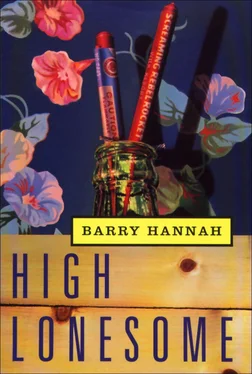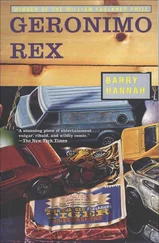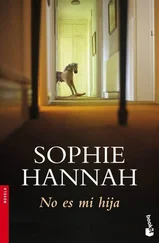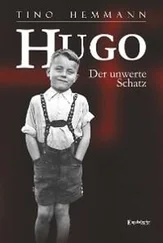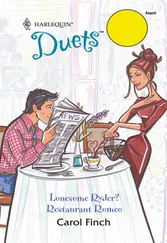Sir, I said, Sir, don’t you have my horn? If so, just keep it, don’t think a thing about it. Or you could give it back. Either way your heart desires. I spoke aloud.
The cold in him gave me my brief opportunity. He was not quick enough to drown me out begging. Holy God, the man collapsed when he heard me. On the spot he fell inwards. You saw what a delicate thing his need was. Reversed, begged at, he suffered spasms of revolution. Under the ambitious hat you saw the woe of an artist gripped in bankruptcy.
The horn, devoured so long ago, the idea of the horn pitched him into such a rage about every delinquency of the planet he could not finish yelling them out. He could not possibly announce all that was owed him. He broke down in a sickness of decomposition. I was a heinous agent from the Outer and his beany eyes magnified me. He shrank in his thin suit. He was a dog rolled over in awe, spreading his legs to explain his inconsequence. His protests died choking.
Say, there’s not that much to it, man. We could let it go. It’s just I’ve waited so long, the months of growing this beard on my face, I said.
He jumped towards me and put his hands around my throat. But then he shrank back in his suit odor. The odor was not that bad, either that or I had become married to it in my long wait for the horn.
The philosopher had it right, the monkey scratches its fleas with the key that opens its cage. I was liberated to speak by the whiskey but more by the bum, while he dove back in his cage at the horror of being asked for anything back. The whirlpool of need stopped cold by a simple request.
He ran off somewhere and then was here again. I had the old horn back in my hands, just a shade greener with corrosion, and I was free to see my youth again. From then on he would hardly look at me until one day he and the hat were immobilized by sleet. I think he was dead or very ill, squatted there in a stare. Maybe he was me in my old age. I didn’t want to age anymore up north. I took a bus driven nearly walking speed back to my own rented lands.
In the warmth I got a temper on me, in my old town much the same except they sold more whitened lawn turd and the billboards had taken over the air crying Money! It was hard to go back to my room because the woman still lived over there darker, and her hair streaked with gray, very long and neglected. The rumor was that alone, she hardly left her chair. I was not prepared to see her in the very same chair, in the exact old place, the vista through the tree obscured by the leaves of spring. I had a temper now, though, I was advanced. I could be, finally, sullen. My life’s work was ahead of me. Now was not the time for sullenness. The leaves should not have made me so angry. I was having my sullen stage inappropriate to my season. My region was covered in leaves, steaming leaves and giant insects and cats screeching as they mated, infamy proceeding regardless of the churches and their desperate parking flats swept clean to the point of cruelty. Beating back nature was the obsession of men in these suburbs, and failing that, arranging it like a combed orphan. But you could wake up here with new vines in your room like criminals.
In my absence my parents had gotten a dark orange boxer bitch. They had more affection for the animal than me, but that didn’t upset me. I wanted alone in my work whenever I found it. The dog went around the house hiding meal bones in cushions and nooks. This delighted the folks. Look at her, such a steward! Why can’t you be such a steward? This was their favorite parable from Scripture, the Good Steward. But I got home so poor I was wearing my pa’s shirts rolled up at the sleeves.
For a while I was excused as a patient in need of food and exercise. I seemed weaker than I was. I brought an old typewriter from the back porch to my room. Here I practiced letterheads for my work, toiling through several choices. A position I could hurl all my resources at, but I had none much, only fear and indignation until I settled on church trumpet. Within the day I was combing my hair differently and carried my letterheads from room to room, trailed by the orange boxer who wanted me for a friend.
My folks went all out as if this was the last gift to me and bought me a new horn. I would take myself to huge wealthy churches with their mobs of penitents. The woman, sitting in her chair, while the brown toasted loaf floated to her, out of the curtain it seemed, until I recalled the husband’s near-bald head above in it — I used this mystery in my horn and had new tones. Many horns, hundreds, were in the Scriptures, I reasoned. They would see I was necessary. I would be history walking in, an old friend.
But just now with the folks out, I went out to the tree where it was wet from rain and cut the leaves back for the notch, such a hallowed ordinary thing to be doing in these suburbs. I wore Pa’s big rubber boots. We had a long trimmer for the job and I never looked away until I exhausted my steward’s duty. But when I appeared again in my room I was naked except for the boots and the new trumpet at my belly, feeling this was how the Hebrew trumpeters of old were, they must have been. In my work. My hair was fresh from the rain and recombed in my new way. In my horn would be the beggar of New York too. And the orange dog with her belligerent adoration.
Older and darker, she was in the chair, which had been turned a little, more toward me, so that half her face might be watching me from its one eye. I in my maturity. She looked the age of a matron doing the rumba in a film I had long ago endured. They whispered she was now either a drunkard or had been lamed by a stroke. I was late, so late. So like me to turn up just in time for despair. You know the type. Several ambulances had come and gone at her place, the word was. But I begged, again the beggar, Let that which remains reveal itself, Let there be a spark of health still in her. Let my music enter her to assuage our loneliness. All she had to do was give me some sign. She had been in my dreams waking and sleeping for so long. My youth sobbed at her window. Help me, where were you? How could you live through that afternoon and have nothing more for me? You are famous in your rousing obscurity for many wretches and their duplicates in New York. For you I have borne the tale without quite having the message. Here, with my combed hair, look! I shouted through my open window. Grown, my voice no longer had that ugly wayward whine. I felt I was succeeding. This house was cast loose in this rain like a wild brick boat and I was in the wheelhouse. We were nosing into the swells. Ahoy. I with my profession. She in her enigma my woman. I was finally deep in the world, like the beggar and the others I envied.
I didn’t go on forever. I couldn’t be sure she’d ever looked even as I began playing my trumpet. In the manner of Gideon at sea, those hours until my lips went to blubber. And Jonah spat up onshore, returned in his ministry to our difficult homeland.
Although she never said so, I believe Mother had taken a job since I was in the house. Sometimes she was away weeks, so in essence the house was mine. When she returned it was in every case that she caught me in the act going about various manipulations at the window. Consider her punctuality, the unmitigated shame of this, for after all I was grown. It was as if she stayed under the house and came up only when she heard noises. I was not yet going to the churches, going about my internship there. She was promptly in the room from nowhere suddenly, myself a wincing wreck. There’s never really time to develop one’s ambitions. They just throw you out there and you grab on to something handy like an amateur, in terror. Hardly time to hide your cheap scotch and prepare a face. Pa, for instance, had chosen wrongly, rushed to life insurance when he wanted to be a cowboy, then panicked by my advent, my whirling hole of needs. Forced into his lies: I love you, love you, boy. It was grievous, but he still managed in his sentimental way to be gone huge lengths of time like a star of the rodeo. I see my pa sitting in his parked car for hours looking at true horsemen in a lot somewhere, bewitched and sad.
Читать дальше
